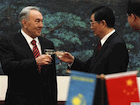 Kazakh President Nursultan Nazarbaev has wrapped up a visit to China and is heading home with lucrative contracts to supply China with energy resources and promises of some $7 billion in Chinese loans for projects in Kazakhstan.
Kazakh President Nursultan Nazarbaev has wrapped up a visit to China and is heading home with lucrative contracts to supply China with energy resources and promises of some $7 billion in Chinese loans for projects in Kazakhstan.
Analysts say Nazarbaev's three days of deal-making highlight improved relations between Kazakhstan and China, and note that there is common ground for future agreements. During his trip, Nazarbaev hailed Sino-Kazakh relations on several occasions, noting that bilateral trade rose to some $20 billion in 2010, a 45 percent increase over 2009 trade figures.
The biggest deal made on this visit was an agreement to supply China with a huge amount of uranium -- up to 55,000 tons. Nazarbaev said Kazakhstan was ready to supply some 40 percent of China's uranium needs. Noting those sales would be worth "tens of billions of dollars" for Kazakhstan, Nazarbaev also claimed those uranium sales were worth more than Kazakhstan's sales of oil and gas to China.
Few details were provided about the uranium deal. But in light of Kazakhstan's goal of producing some 19,600 tons of uranium this year, the agreement clearly spans several years at least. The state nuclear company Kazatomprom, whose representatives were part of the delegation that accompanied Nazarbaev, added to the spirit of energy cooperation by signing an agreement with the Guangdong Nuclear Power Company on participation in an investment fund.
Richard Lockhart, a senior editor at the Scotland-based NewsBase group in charge of its weekly publication "Energo," says that Kazakhstan and China share solid common ground for cooperation in the sphere of energy.
He notes that Kazakhstan is the world's leading uranium producer, having increased output by nearly 40 percent in 2010, and China looking to greatly increase nuclear-generated electricity (from current 9,000 megawatts to some 80,000 MW) by 2020.
"Kazakhstan does have uranium to export," Lockhart says. "On the other hand, China needs uranium as China is expanding its nuclear-power sector."
Lockhart says this latest deal shows that Kazakh-Chinese relations are improving quickly.
"It means that Kazakhstan and China are becoming closer partners. This uranium was signed alongside a package of other deals concerning energy, infrastructure, loans, and so forth, [and] many of Kazakhstan's projects are partly funded by Chinese loans and investment as well."
Nazarbaev noted that there are more than 1,000 joint enterprises with Chinese investments in Kazakhstan, and many more deals appear to be on the way.
A joint communique made mention of the China National Petroleum Corp's participation in developing the Urikhtau gas deposit in western Kazakhstan. That gas would then be exported to China via a new pipeline that is already under construction.
In what has become a common practice in China's dealings with the Central Asian states, Beijing is also making some large loans available to Kazakhstan. Nazarbaev and Chinese President Hu Jintao discussed a $5 billion loan for a petrochemical complex and there is an agreement for China to loan Kazakhstan's sovereign wealth fund Samruk-Kazyna $1.7 billion.
Kazakhstan's state railway company, Temir Zholy, and China's Railways Ministry also announced a deal to build a high-speed train line running between the Kazakh capital, Astana, in the north and Kazakhstan's commercial capital, Almaty, in the south. The new 1,050-kilometer rail line would cut travel time between the two cities nearly in half. Nazarbaev called that deal "an important result of my visit to China this time."
The two sides signed an intergovernmental agreement on trans-border rivers, a particularly sensitive issue since it involves China's increased use of water for the growing oil industry in western China's Xinjiang Uyghur Autonomous Region. Kazakhstan's government has agreed to this but there are concerns in Kazakhstan and in Russia that China's siphoning off of water will have disastrous environmental consequences for Kazakh and Russian cities near the Chinese border. Another deal covered construction of the Khorgos "international" center for border cooperation.
www.rferl.org




